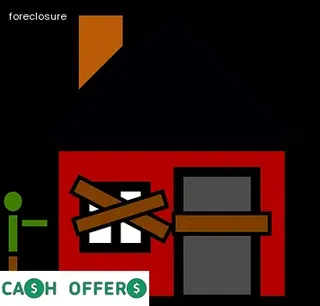Foreclosures in California can be a difficult and confusing process, but understanding the rules and regulations is key to making the right decisions. The foreclosure process in California begins with a Notice of Default, which is filed with the county recorder's office.
This document serves to notify the borrower that they have defaulted on their loan payments and gives them an opportunity to cure the default before further action is taken. If payments are not made, a Notice of Sale will be issued and published in a newspaper of general circulation.
After this has occurred, the lender can then proceed with a foreclosure sale at auction where the home can be sold to repay the debt owed on it. Borrowers should understand that they may still owe money even after their house has been sold at auction; if this happens, it is referred to as a deficiency judgment.
Additionally, it's important for borrowers in California to know that there are several options available for them when facing foreclosure such as loan modification or forbearance programs and short sales. It's important for borrowers to take into consideration all of their options before letting their house go, so they can make sure they get the best outcome possible.

Exploring preforeclosure options is a crucial step in understanding the foreclosure process in California. Before letting your house go, it is important to be aware of the different alternatives available which can help you avoid the possibility of foreclosure altogether.
Many homeowners in California are able to find ways to stay in their homes and keep their mortgages current without entering into foreclosure. This can be done through loan modifications, short sales, deed-in-lieu of foreclosure, or forbearance agreements.
Loan modifications allow borrowers to receive better terms on their mortgage loans and reduce monthly payments. Short sales involve selling the home for less than the outstanding balance of the loan and any profits from the sale are used to pay off the remaining balance on the mortgage.
A deed-in-lieu of foreclosure allows homeowners to give up their title to a property in exchange for releasing them from their financial obligations associated with that property. Forbearance agreements allow borrowers who have fallen behind on their mortgage payments to catch up by allowing lenders to temporarily suspend or reduce payments for a specific period of time.
In California, foreclosure is a legal process that allows lenders to take possession of a home when a borrower fails to make their mortgage payments. The process begins when the lender files a Notice of Default (NOD) with the county recorder’s office.
Property owners then have 90 days to get current on their mortgage or the lender can start foreclosure proceedings. Once the NOD is filed, homeowners may be eligible for loan modifications or other assistance programs offered by lenders.
The foreclosure process continues if there are no workout arrangements and the property is sold at public auction. After the sale, the homeowner must vacate the property within 30 days and surrender it to the new owner.
During this process, homeowners have certain rights and may be able to stop foreclosure through bankruptcy protection or other methods of dispute resolution. Borrowers should understand their rights and explore all options before letting their house go into foreclosure in California.

Foreclosing on a home in California is typically one of two main types: a judicial foreclosure or a non-judicial foreclosure. A judicial foreclosure involves the court system, where the lender files a lawsuit against the borrower for defaulting on their mortgage payments and obtains a court order to begin the process.
This type of foreclosure typically takes longer than its non-judicial counterpart, but it may be necessary in certain cases depending on the loan agreement and state law. With a non-judicial foreclosure, there is no court involvement; instead, the lender uses an existing power of sale clause in the mortgage document to appoint an outside party to sell the home at auction.
This type of foreclosure tends to move more quickly than judicial foreclosures due to its streamlined nature. Both types of foreclosures can have serious repercussions for homeowners, so before letting your house go, it’s important to understand all your options and what you should expect throughout the process.
In California, there are a few important strategies to be aware of when it comes to avoiding or stopping a foreclosure. Firstly, homeowners should talk with their lender as soon as they first notice missed payments or become aware of the possibility that they may not be able to make payments due to financial hardship.
A lender may be willing to work with the homeowner on a repayment plan that can help them catch up on payments and avoid going into foreclosure. Secondly, homeowners should look into loan modification options such as refinancing or forbearance plans.
These plans can lower monthly mortgage payments and offer more flexibility in repayment terms. Additionally, it's important for homeowners to keep track of all paperwork and communications related to their loan so that they're aware of their rights throughout the process.
Lastly, although it's an extreme measure, if all else fails, selling the home may be an option for some homeowners who are unable to make their payments and facing foreclosure. It's important for homeowners in this situation to research the market value of their property before putting it up for sale so that they receive fair compensation for their home in the end.

In California, a deficiency judgment is a court order that requires an individual to pay the remaining balance of their loan if their foreclosure property sells for less than what was owed on it. When this happens, the lender can collect the difference from the borrower in either a lump sum or through monthly payments.
This can be very difficult for homeowners to manage financially, especially if they have already lost their home. Additionally, the state of California has laws in place that limit the amount of time and extent that lenders can pursue a deficiency judgment against borrowers after their foreclosure property has been sold.
Generally speaking, lenders must file a lawsuit within three years from the sale date of the property to obtain a deficiency judgment as well as provide proof that all potential buyers were given an opportunity to bid on the property. This helps protect homeowners from having to pay more than what was fair when selling their home.
California homeowners should be aware of their rights during the foreclosure process. The California Homeowner Bill of Rights (HBOR) was signed into law to protect homeowners from predatory lending practices and deceptive foreclosures.
It outlines the responsibilities of lenders and servicers, including providing written notice if a borrower is delinquent on loan payments, notifying borrowers of any action taken to accelerate or foreclose on a loan, and providing borrowers with a single point of contact when their loans are serviced by another company. In addition, the HBOR requires lenders to give homeowners a reasonable opportunity to cure any delinquency before they can proceed with foreclosure.
Homeowners have the right to challenge any actions taken against them, and they have access to legal representation throughout the entire process. Foreclosure in California is a long and complicated process that all homeowners should be familiar with, as understanding their rights may make it easier for them to keep their homes.

Moving out of a home after a foreclosure in California can be a stressful and emotional experience. It is important to understand the timeline of how long you have to vacate the property and the importance of staying informed throughout the entire process.
Foreclosure proceedings in California typically take anywhere from 90 days to 6 months, depending on if it is non-judicial or judicial. During this time, it is important to review all paperwork carefully and consult with an attorney if needed.
While the majority of homeowners must move out by the time their foreclosure sale is final, some may be eligible for relocation assistance from their lender. This assistance may include additional time to vacate or other resources such as financial aid for renting a new place or finding another job.
Additionally, homeowners should consider taking steps to protect their credit rating during this difficult period by understanding their rights and working with mortgage counselors who can help them explore options available to them under state law.
When facing a foreclosure, many homeowners in California feel overwhelmed and unsure of where to turn. Fortunately, it is possible to get expert assistance with the process.
Legal professionals specializing in foreclosures can provide guidance on how to proceed and can also represent homeowners in court if necessary. In addition to legal experts, there are several organizations throughout California that offer counseling and lending services to those struggling with their mortgage payments.
These groups can help individuals understand the foreclosure process and make informed decisions about their finances. It is important for homeowners facing foreclosure to seek out these resources as soon as possible in order to protect their rights and maximize their chances of minimizing financial losses associated with the foreclosure process.

The Homeowner Bill of Rights (HBOR) was created to help protect homeowners in California during the foreclosure process. The bill provides several benefits that give homeowners more control over their situation and can help them make an informed decision about their future.
It requires lenders to provide borrowers with more accurate information, so they can better understand their rights and obligations. Furthermore, it lengthens the foreclosure timeline, giving borrowers more time to explore alternative options such as loan modifications or refinancing.
It also allows homeowners to pursue legal action if they believe a lender has violated their rights, which could help prevent further financial harm. By evaluating the potential benefits of HBOR, distressed homeowners in California can make a better-informed decision about whether or not to move forward with foreclosure proceedings.
The foreclosure process in California begins with the lender sending a notice of default to the borrower. This is the first step in the foreclosure process and is typically sent when payments have not been made for 90 days or more.
It informs the borrower that they are in default of their loan agreement and allows them 30 days to begin making payments or negotiate a repayment plan. If payments are not made, the next step is for the lender to file a Notice of Sale with the county recorder’s office.
This document includes information about when and where the auction of the property will take place. The homeowner will also receive a copy of this document which serves as advance warning that they must vacate the property before it is sold at auction.
After this, another notice is posted on or near the property that contains more detailed information such as how much money must be paid by a certain date in order to stop the sale. Lastly, once all notices have been filed and posted, an auction date is set and advertised publicly through newspapers, websites and other media outlets.
On this date, bids are taken from buyers who want to purchase the home at a discounted price. If no qualified buyer emerges then ownership reverts back to lender who can then work out an alternate solution with owner such as entering into a short sale or deed-in-lieu transaction.

When facing a foreclosure, it is important to understand how to apply for a mortgage modification. A mortgage modification is an arrangement between the lender and borrower that changes the terms of the loan in order to make repayment easier.
In California, homeowners can apply for a mortgage modification during the foreclosure process by submitting a Request For Mortgage Assistance Form (RFMA) with their lender or servicer. The RFMA must include all necessary documents such as income verification, hardship letters and tax returns.
After submitting the RFMA, borrowers will receive a decision from the lender or servicer regarding their eligibility for mortgage modification. If approved, borrowers will be required to provide additional information and documents in order to complete the process.
It is important for borrowers to stay up-to-date on their loan payments while waiting for an approval decision from the lender or servicer in order to avoid further damage to their credit score. Applying for a mortgage modification is not always successful but understanding the process may help homeowners in California save their house from foreclosure.
The foreclosure process in California can be intimidating and confusing for homeowners. Before the sale, homeowners should understand their legal rights and any options available to avoid foreclosure.
It is important to know that lenders must follow certain procedures before taking possession of the property and initiating a foreclosure sale. Once the sale has been scheduled, there are specific steps that lenders must take to ensure fair treatment of all involved parties.
During the sale, it is important to be aware of the various types of bids that may be accepted by the lender, such as credit bids or cash bids. After the sale has taken place, homeowners will receive notice from either their lender or a public trustee regarding whether or not they have a right to redeem their home.
If they do not have this right, they will need to vacate the property within a period of time specified by law. Homeowners should also keep in mind that even after the sale has taken place and they have moved out, they may still owe money on their mortgages if the bid did not cover all amounts owed on their loans.
Knowing what to expect before, during, and after a foreclosure sale in California can help reduce some of the stress associated with this difficult situation.

When faced with the reality of foreclosure, it’s important to explore all potential alternatives before letting your house go into foreclosure. An experienced real estate attorney can help you understand the ramifications of foreclosure and assess the viability of other options such as loan modifications, short sales, or deed-in-lieu of foreclosure agreements.
Loan modifications allow you to keep your home if you can meet certain criteria and make arrangements with your lender. Short sales involve selling your property for less than what is owed on the mortgage and having the bank accept the remaining balance as payment in full.
Deed-in-lieu of foreclosure agreements are a last resort but may be an option if all other attempts have not been successful. In addition, some states have consumer protection laws that enable homeowners to take advantage of mediation services between borrowers and lenders during a foreclosure process.
If you are facing a possible foreclosure, researching all available alternatives is key to making sure you protect yourself and your property rights as much as possible.
When it comes to understanding the foreclosure process in California, assessing potential tax liabilities from a home loan default is an important factor to consider. The Internal Revenue Service (IRS) may consider any debt that is discharged by the lender or borrower as taxable income.
This means that if your house goes into foreclosure, the amount of money that you owe could be considered taxable under certain circumstances. In some cases, you may even be able to deduct some of the losses you suffer due to the foreclosure on your tax return.
It is important to understand how the IRS will view your situation and consult with a qualified tax professional before making any decisions related to letting your house go. Knowing how taxes will affect your decision can help ensure that you make an informed choice when considering whether or not to proceed with a foreclosure.

The Deed-in-Lieu process is an alternative to traditional foreclosure, and can be a viable solution for those facing financial hardship in California. Under the process, homeowners agree to transfer their property back to the lender in order to relieve themselves of the debt obligation associated with their mortgage.
This can help reduce or avoid foreclosure proceedings while allowing homeowners to remain in possession of their property until the transfer occurs. In some cases, lenders may also offer incentives such as relocation assistance or mortgage forbearance.
It’s important to note that there are still potential risks involved when considering a Deed-in-Lieu agreement, so it’s crucial for homeowners to take the time necessary to make sure they understand all aspects of the transaction before agreeing. Homeowners should also be aware of any legal restrictions that may apply in California, as well as any tax implications associated with accepting this type of agreement before making a decision.
When a homeowner is facing foreclosure in California, they may consider attempting a short sale to avoid the long-term repercussions of the process. This situation is known as a preforeclose and can be especially difficult for homeowners to maneuver.
If a short sale option is successful, it can help limit the damage to the individual's credit score and financial health. However, even if the short sale is successful, there are still post-foreclose challenges that need to be addressed.
These include potential claims from lenders for damages or other items related to nonpayment of loan installments. Homeowners should understand their rights and obligations during this time, as well as any applicable laws or regulations that might affect them in order to navigate these issues effectively.
Additionally, they should seek professional guidance if possible in order to ensure that their interests are protected throughout the entire process.

When it comes to understanding the foreclosure process in California, one of the most important factors to consider is whether or not bankruptcy is an option. Bankruptcy can be an effective way to protect yourself from a foreclosure and prevent your home from being taken away.
It can also provide you with some leverage in negotiating with your lender and may even help you keep your home if you are able to make a repayment plan that works for both parties. Before deciding whether or not bankruptcy is the right choice for you, it is important to understand the different types of bankruptcies and how they might impact your situation.
Additionally, consulting with a qualified attorney who specializes in foreclosure law can help you determine whether bankruptcy will provide any benefit during a foreclosure. Ultimately, determining if filing for bankruptcy is an option during a foreclosure is an important step in understanding the entire process and making sure that you have all of the information necessary before making any decisions about letting go of your house.
The foreclosure process in California can be a lengthy and complicated one. Depending on the lender, when the homeowner falls into default, it can take anywhere from 3-12 months for them to complete the foreclosure process.
The reason for this is that lenders must follow specific protocols during the foreclosure process, including providing notice to the homeowner of their intent to foreclose. Additionally, if the property is located in a judicial foreclosure state such as California, there are additional steps which must be taken by the lender before they can foreclose on a property.
These steps often include filing a lawsuit against the borrower with the court and obtaining an order of sale through a judge prior to initiating the sale of a home at auction. While it may seem daunting, understanding these steps and being prepared are key in avoiding or minimizing delays in the foreclosure process.

When it comes to foreclosure, the amount of time that it stays on your record can vary from state to state. In California, however, the amount of time that a foreclosure remains on your credit report is seven years.
It’s important to understand this timeline in order to make an informed decision about what to do with your property if you are considering letting it go. A foreclosure will stay on your record for seven years, so you should consider the impact this could have on your credit score and future loan applications before making any decisions.
Additionally, there are other factors that can affect how long a foreclosure stays on your credit report such as whether or not you have been able to pay off any outstanding debts related to the foreclosed property. Knowing how long a foreclosure stays on your record in California is critical for anyone considering letting their house go through this process.
In California, a homeowner must have missed three or more payments before the lender can start the foreclosure process. Typically, a borrower is given a period of time to catch up on payments before the foreclosure papers are filed with the court.
During this period, lenders may offer options such as loan modifications and repayment plans to help homeowners avoid foreclosure. If the homeowner is unable to make these payments, then the lender will move forward with filing for foreclosure.
Once a Notice of Default is issued by the lender, it typically takes between 30-120 days for a Notice of Sale to be recorded and published in newspapers announcing that the property is scheduled for auction. Knowing how many missed payments are necessary before a foreclosure in California is crucial for understanding the foreclosure process and taking action before it’s too late.
In California, the cost of foreclosure fees can vary significantly depending on the county where the foreclosure is taking place. Generally, some of the costs associated with a foreclosure in California include filing fees, mediation fees, title search and recording fees, administrative expenses and attorney’s fees.
Additionally, legal notices must be published in a newspaper for a certain amount of time before the sale can take place. These costs can range from $1,500 to over $5,000 in some cases.
It's important to keep an eye out for any additional charges that may be added after the initial filing fee as these will add up quickly. The best way to get an accurate estimate of what your foreclosure costs might be is to consult with a knowledgeable real estate attorney who is familiar with California law and how foreclosures are handled in your particular county.
A: In California, the foreclosure process is handled by a court or trustee depending on the type of loan. The homeowner must be provided with at least 90 days written notice before any foreclosure action is taken. Additionally, there are several state-run and federally funded financial assistance programs that can help homeowners who are facing foreclosure such as CalHFA Foreclosure Assistance Program and Keep Your Home California.
A: If you allow your home to go into foreclosure in California, there may be several financial consequences, including a potential tax liability. Your lender is required to report the amount of debt forgiven on Form 1099-C to both you and the IRS. Depending on your particular situation, this amount may be taxable as income, potentially resulting in a large tax bill come April. It is always best to consult with a qualified accountant or tax attorney for more information about any potential tax liabilities associated with foreclosure.